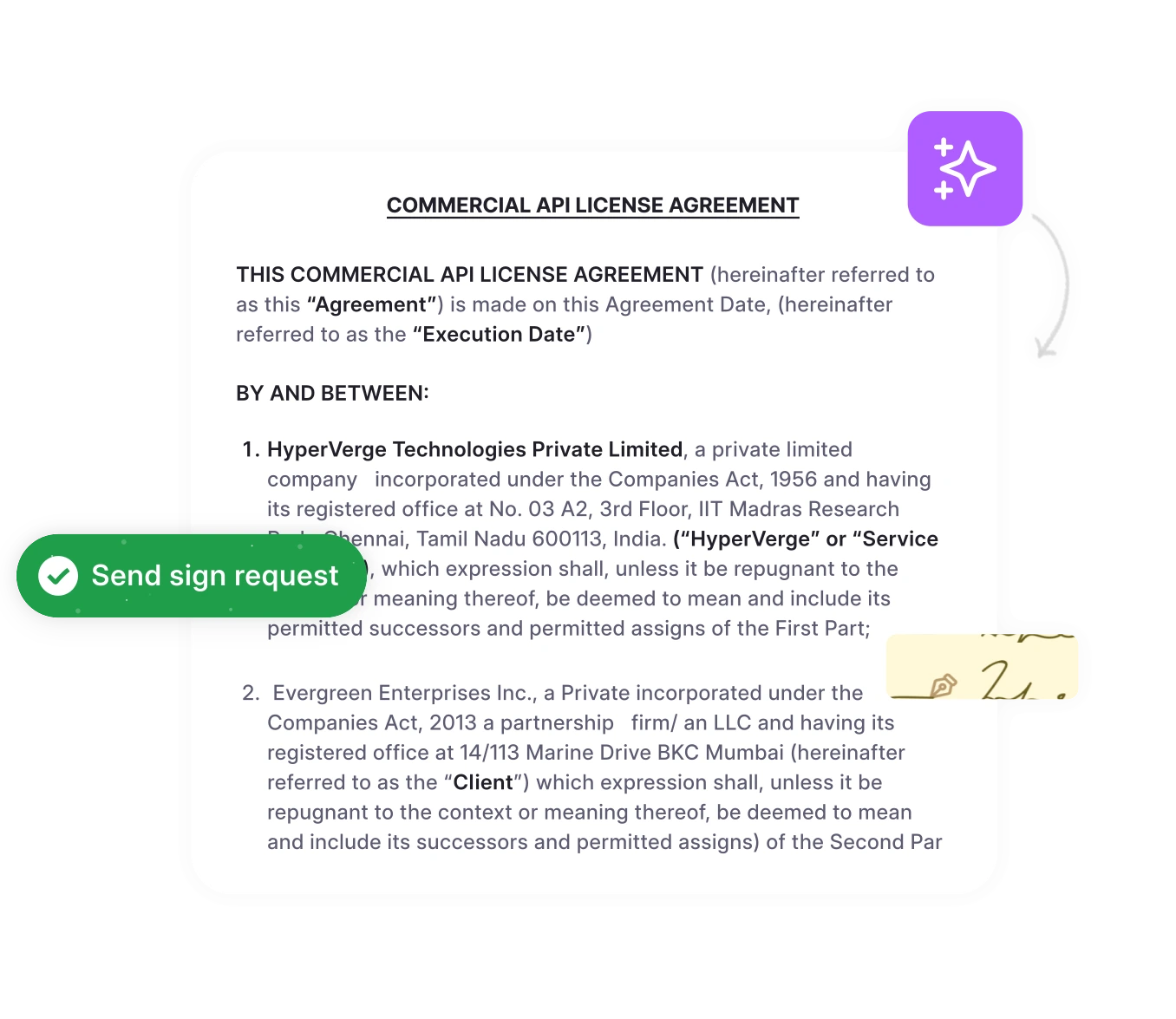Unclear deliverables, intellectual property disputes, and missed campaign deadlines. Challenges like these plague businesses and agencies when marketing agreements lack proper structure.
Whether you’re hiring an agency for a full-scale campaign, partnering with an influencer for social media promotion, or collaborating with another business on co-marketing initiatives, a well-drafted marketing agreement protects both parties and ensures successful outcomes. This comprehensive guide covers essential components, different types, common pitfalls, and strategies to streamline management through contract lifecycle management automation.
What is a marketing agreement?
A marketing agreement is a formal legal contract that establishes the terms and conditions under which a business receives marketing services from a provider such as an agency, consultant, or contractor. The agreement defines the relationship between parties, outlines specific marketing activities to be performed, and sets clear expectations for deliverables, timelines, payment, and intellectual property rights.
These contracts document responsibilities, protect both parties’ interests, and provide a clear dispute-resolution framework. For marketing, this can range from simple contracts with individual freelancers to complex multi-year contracts with full-service agencies.
For example, a SaaS company might execute a marketing agreement with a digital agency to handle content marketing, specifying 12 blog posts per month, social media management across three platforms, and monthly performance reporting.
Understanding the fundamentals of business contracts provides a strong foundation for drafting marketing agreements. Additionally, reviewing essential contract elements helps ensure your marketing agreements are comprehensive and enforceable.
Key components every marketing agreement must include
Every effective marketing agreement contains specific elements that protect both parties and establish clear expectations. While complexity varies based on the scope and duration of the engagement, certain components are essential regardless of the marketing services being provided.
The table below outlines the critical components that should appear in every marketing agreement:
| Component | Description |
| Parties and contact information | Legal names, addresses, and primary contacts for client and service provider |
| Scope of services | Detailed description of marketing activities, channels, and responsibilities |
| Deliverables and timelines | Specific outputs with formats, quantities, quality standards, and due dates |
| Compensation and payment terms | Fee structure (retainer, project-based, hourly), payment schedule, and expense policies |
| Intellectual property rights | Ownership terms for creative assets, content, campaign, and such third party materials |
| Performance metrics and KPIs | Measurable success indicators and reporting requirements |
| Confidentiality and non-disclosure | Protection of proprietary information, trade secrets, and business data |
| Term and termination conditions | Contract duration and circumstances under which either party can end the agreement |
| Dispute resolution | Procedures for handling disagreements, including mediation or arbitration |
| Governing law and jurisdiction | Legal framework and location for resolving contract issues |
These foundational elements ensure both parties understand their obligations and have legal recourse if problems arise. Clear documentation prevents misunderstandings that can derail marketing campaigns and damage business relationships.
The right contract ensures that partnerships run smoothly and transparently. Given today’s complex marketing ecosystem, a well-structured contract that promotes trust and accountability is a must-have for all advertisers.
Read
Understanding essential contract clauses helps you build comprehensive marketing contracts. Additionally, reviewing service agreement best practices ensures your agreements protect your interests while enabling successful partnerships.
Tired of tracking renewals manually?
AI-powered contract management automates marketing agreement workflows from drafting to commitment and compliance monitoring.
Book a DemoWho are the key parties involved in marketing agreements?
Marketing agreements involve various types of service providers depending on the scope and nature of the engagement. Knowing the different parties helps businesses select the right partner and structure appropriate contract terms.
The contract management team often coordinates these relationships to ensure compliance. Common parties include:
- Marketing agencies: Full-service firms providing comprehensive marketing services, including strategy, creative development, campaign execution, and analytics. Agencies typically work on a retainer or project basis and handle multiple marketing channels simultaneously.
- Independent marketing consultants: Independent contractors offering specialized knowledge in areas like marketing strategy, brand positioning, or digital transformation. Consultants usually engage in shorter-term projects focused on specific business challenges.
- Freelance marketing contractors: Self-employed marketing professionals providing specific services such as copywriting, graphic design, SEO optimization, or social media management. Marketing contractor agreement arrangements often follow independent contractor agreement structures with clear deliverable specifications.
- Influencers and content creators: Individuals with established audiences who promote products or services through authentic content on social media platforms. A social media marketing agreement template includes unique terms addressing content approval, FTC disclosure, and usage rights.
- Co-marketing partners: Other businesses collaborating on joint marketing initiatives to share costs, combine audiences, and amplify reach. These partnerships involve mutual obligations and shared performance goals.
What are the different types of marketing agreements?
Marketing agreements vary significantly based on the relationship structure, services provided, and business objectives. Understanding these different types helps you select the right contractual framework for your specific marketing needs.
Reviewing partnership agreement templates can be helpful when structuring collaborative relationships. Additionally, exploring various types of contracts ensures you understand the distinctions and create agreements suited to your situation.
The table below compares the most common marketing agreement types:
| Type | Primary use case | Key parties | Typical duration |
| Marketing agency agreement | Ongoing, full-service marketing needs across multiple channels | Business + Marketing agency | 6-12 months (retainer-based) |
| Marketing consultant agreement | Specialized expertise or strategic guidance on specific initiatives | Business + Individual consultant | 3-6 months (project-based) |
| Influencer marketing agreement | Social media campaigns leveraging established audiences | Brand + Influencer/content creator | 1-3 months (campaign-specific) |
| Co-marketing/Joint marketing agreement | Collaborative campaigns to reach shared target audiences | Two or more businesses | 3-12 months |
| Affiliate marketing agreement | Performance-based promotion with commission structure | Business + Affiliate marketer | Ongoing (until terminated) |
| Digital marketing services agreement | Specific online marketing activities like SEO, PPC, or social media | Business + Agency or freelancer | 3-12 months |
1. Marketing agency agreements
Marketing vendor agreements establish ongoing relationships between businesses and full-service marketing firms. These contracts suit companies needing comprehensive marketing support across multiple channels.
Using a marketing agency agreement template typically follows either retainer models with monthly fees or project-based structures for specific campaigns. Common deliverables include marketing strategy documents, creative assets, campaign execution, and regular performance reporting.
2. Co-marketing and joint marketing agreements
Co-marketing agreements facilitate collaboration between businesses that share complementary audiences or strategic objectives. These partnerships allow companies to pool marketing budgets, combine audience reach, and create more impactful campaigns.
Unique clauses address cost-sharing arrangements, co-branding guidelines, lead distribution formulas, and intellectual property ownership of jointly created materials. For example, two SaaS companies might co-host a webinar series, splitting costs and sharing resulting leads.
3. Influencer marketing agreements
Influencer marketing agreements govern relationships between brands and individuals with established followings on social media platforms. These contracts have grown dramatically with the rise of creator economies on platforms like Instagram, TikTok, YouTube, and LinkedIn.
Unique requirements include mandatory FTC disclosure language for sponsored content, content approval rights for brands to review posts before publication, usage rights specifying how brands can repurpose content, and exclusivity clauses. Platform-specific considerations address posting schedules, hashtag requirements, and content format specifications.
4. Marketing consultant and contractor agreements
Marketing consultant and contractor agreements engage individual experts for specialized skills in areas like SEO optimization, content strategy, marketing automation, or conversion rate optimization. These arrangements are ideal for businesses needing focused expertise rather than full-service support.
Unlike agency relationships, consultant agreements typically focus on project-based engagements delivering specific outcomes such as a marketing strategy document or campaign launch. Deliverables include strategic recommendations, implementation plans, and knowledge transfer documentation.
How do marketing agreements differ from other business contracts?
While it shares common elements with other business contracts, the typical marketing agreement reflects the creative, performance-driven nature of marketing work. Understanding these distinctions helps businesses draft appropriate agreements that address marketing-specific considerations.
| Aspect | Marketing agreement | General service agreement | Partnership agreement |
| Primary focus | Creative deliverables, campaign performance, brand alignment | Task completion, service delivery, technical specifications | Shared business goals, mutual growth, profit distribution |
| Performance metrics | Engagement rates, conversions, ROI, brand awareness, audience growth | Completion milestones, service level agreements, response times | Revenue targets, market share, strategic objectives |
| IP considerations | High importance – ownership of creative assets, content, campaign materials | Moderate – typically work product belongs to client | Variable – depends on collaborative creation and brand usage |
| Typical parties | Client + Agency/consultant/influencer | Client + Service provider (various industries) | Two or more businesses with complementary strengths |
| Duration and structure | Campaign-based (1-3 months) or retainer (6-12 months) | Project-based or ongoing maintenance | Long-term strategic relationships (multi-year) |
Marketing agreements emphasize measurable results, creative quality, and brand representation in ways that general service contracts typically don’t. The high intellectual property stakes in marketing work require detailed ownership and usage terms.
Choose marketing-specific agreement structures when engaging providers for promotional activities, content creation, or audience engagement rather than generic service contract templates. Beyond understanding these structural differences, well-drafted marketing agreements deliver concrete benefits for both parties.
Why businesses need marketing agreements
Formal marketing agreements provide essential protections and establish frameworks that benefit both clients and service providers. These contracts prevent misunderstandings, protect investments, and create accountability mechanisms that lead to more successful marketing outcomes.
According to Gartner research, poor contract management can cause organizations to lose up to 40% of their deal value, underscoring the importance of structured marketing agreement management. Strong agreements support contract compliance throughout the engagement. They also enable effective contract performance management by establishing clear metrics and obligations.
Here are the 7 key benefits of using marketing agreements:
- Clear expectations and deliverable definitions: Written agreements eliminate ambiguity about what will be delivered, when, and to what standard. This clarity prevents the common scenario where clients expect comprehensive services while providers believe they are committed to a limited scope.
- Payment security and budget protection: Detailed payment terms protect both parties by establishing when payments are due, what triggers payment obligations, and how additional work outside the original scope will be priced.
- Intellectual property ownership clarity: Marketing agreements explicitly state who owns created content, campaign materials, creative assets, and data. This prevents costly disputes over usage rights and ensures businesses can continue using marketing materials after the contract ends.
- Performance measurement standards: Agreements establish specific KPIs, analytics requirements, and reporting obligations that allow objective evaluation of marketing effectiveness. This data-driven approach replaces subjective assessments with measurable results.
- Legal protection for both parties: Contracts provide recourse if one party fails to meet obligations, protect confidential information through non-disclosure provisions, and limit liability exposure through carefully drafted terms.
- Dispute resolution framework: Pre-established procedures for handling disagreements reduce the likelihood of costly litigation by requiring mediation or arbitration before legal action.
- Compliance safeguards: Marketing agreements can include provisions ensuring FTC disclosure requirements for influencer content, GDPR data privacy compliance for digital campaigns, and platform policy adherence.
Read also Everything You Need to Know About Standardized Contracts
What are the biggest challenges with marketing agreement management?
Even well-intentioned marketing relationships encounter challenges when agreements lack specificity or fail to address common problem areas. Understanding these pitfalls helps businesses draft stronger contracts and avoid disputes that derail campaigns.
When problems do arise, having clear contract dispute resolution procedures can minimize damage. Additionally, conducting thorough contract review processes helps identify potential issues before they escalate.
1. Vague scope of work and deliverable ambiguity
Marketing agreements often fail when they use generic language like “social media management” or “content creation” without defining what these activities actually include. Clients expect comprehensive services while providers believe they are committed to limited activities.
Disagreements arise over revision rounds, with clients requesting unlimited changes and providers believing two rounds were implied. Quality standards remain subjective, leading to conflicts when deliverables don’t meet unstated expectations.
Solution:
Define specific deliverables with precise formats and quantities, such as “4 blog posts per month, 1,500 words each, including SEO optimization.” Specify revision rounds explicitly, typically 2-3 maximum per deliverable.
Include approval workflows with clear decision-makers and response time requirements. Use detailed checklists to track deliverable status and prevent scope creep through documented change order procedures.
2. Intellectual property rights disputes
Confusion about who owns created content, campaign materials, and creative assets leads to costly legal battles and operational disruptions. Businesses assume they own everything they pay for, while agencies expect to retain portfolio rights and reuse certain elements.
The distinction between work-for-hire arrangements and licensing agreements remains unclear. Pre-existing materials like templates, stock assets, and proprietary frameworks get mixed with newly created content without clear ownership delineation.
Solution:
Explicitly state intellectual property transfer terms upfront, specifying which materials transfer to the client upon completion and payment. Define work-for-hire provisions for newly created content intended for client ownership.
Specify licensing rights if the agency retains ownership, including duration and exclusivity terms. Document which party owns pre-existing materials such as templates and stock assets. Include IP transfer timeline provisions to protect providers from non-payment.
3. Payment structure and invoicing confusion
Payment disputes arise when agreements lack clarity about when payments are due, what constitutes completion of billable milestones, and how expenses beyond the base fee will be handled. Retainer versus project-based billing creates confusion about what’s included.
Late payments damage provider’s cash flow without consequences. Additional work outside the original scope gets performed without pricing agreements, leading to surprise invoices that clients refuse to pay.
Solution:
Detailed payment schedules tied to measurable milestones such as “25% upon contract signing, 25% upon strategy approval, 25% upon campaign launch, 25% upon completion.” Specify invoice submission requirements and approval processes with defined response windows.
Define late payment penalties that comply with local regulations. Establish clear approval processes for expenses beyond the base fee, requiring written authorization before incurring costs. Distinguish between retainer fees and project-based payments.
4. Compliance gaps in digital and influencer marketing
Marketing activities increasingly face regulatory scrutiny, particularly in digital advertising and influencer partnerships. According to the Federal Trade Commission, influencers must clearly disclose any material connection, such as being paid or receiving free products, when endorsing brands, ensuring that advertising remains truthful and not misleading. Yet many agreements fail to specify disclosure language or enforcement mechanisms.
GDPR and CCPA impose strict data privacy requirements on digital campaigns, yet contracts often don’t address data handling responsibilities. Platform-specific rules on Instagram, TikTok, and YouTube evolve rapidly, and agreements don’t establish who monitors compliance.
Solution:
Include mandatory FTC disclosure clauses for sponsored content, specifying disclosure language and placement requirements. Specify data handling and privacy compliance requirements under GDPR, CCPA, and other regulations, including data control, retention policies, and breach notification procedures.
Establish content approval workflows for regulated industries. Maintain audit trails through documentation systems, tracking approvals and regulatory adherence. Define responsibility for platform policy adherence on social media platforms.
Scattered contracts causing missed renewals?
Get full visibility and automated alerts for obligations across the board.
Book a DemoHow to draft and structure a marketing agreement effectively
Proper agreement structure ensures all essential elements are included, properly sequenced, and easily understood by both parties. Following a logical format improves enforceability and reduces the likelihood of overlooked terms causing problems later.
Public sector and commercial marketing relationships thrive on fairness, clarity, and mutual respect. Simplifying procurement and ensuring transparent negotiations leads to stronger, longer-lasting partnerships.
Read
Step 1. Define clear marketing objectives and goals
Start by aligning marketing activities to specific business objectives such as increasing brand awareness, generating qualified leads, driving sales, or entering new markets. Specify desired outcomes with measurable targets rather than vague aspirations.
Set realistic expectations for both parties about what marketing activities can achieve within the agreed timeframe and budget. Document how success will be evaluated and what happens if goals aren’t met.
Step 2. Detail specific deliverables and formats
List all deliverables with precise specifications, including format requirements such as blog posts, social media content, video assets, or advertising creatives. Include quantity expectations like “12 blog posts monthly” or “20 social posts weekly.”
Define quality standards through examples of acceptable work or brand guideline requirements. Specify revision rounds allowed, typically 2-3 per deliverable, with procedures for requesting changes.
Step 3. Establish measurable performance metrics
Define key performance indicators aligned to your objectives, such as website traffic growth, engagement rates, lead generation, conversion rates, or return on ad spend. Specify reporting requirements covering frequency, format, and content depth.
Include analytics platform access provisions ensuring clients can verify reported data. Set realistic benchmarks based on industry standards and historical performance.
Step 4. Assign responsibilities and expectations
Clarify what the client must provide, such as brand guidelines, system access, timely approvals, and subject matter expertise. Specify provider obligations covering strategy development, creative execution, campaign management, and performance tracking.
Define communication protocols covering primary contacts, meeting cadence, response time expectations, and escalation paths for urgent issues.
Step 5. Include essential legal protections
Address intellectual property rights comprehensively, specifying ownership of created materials, licensing terms if shared, and treatment of pre-existing materials. Include confidentiality provisions protecting proprietary business information, trade secrets, and customer data.
Add liability limitations and indemnification clauses defining who bears responsibility for specific claims. Specify termination conditions, including written notice requirements and transition procedures upon contract end.
Step 6. Define payment terms and change procedures
Establish the payment structure clearly, whether monthly retainer, project-based fees, hourly rates, or performance-based compensation. Detail the invoice submission and approval process, covering timing, required documentation, and accepted payment methods.
Include change order procedures for scope modifications, requiring written documentation of changes, pricing for additional work, and approval requirements. Specify expense handling for costs such as advertising spend or software subscriptions.
Review the completed agreement for compliance with FTC disclosure requirements, data privacy laws, and industry-specific regulations. Consider having legal counsel review complex agreements before execution.
Read also Commercial Contracts: A Complete Guide
Simplify marketing services agreements with HyperStart
Well-structured marketing agreements lay the foundation for successful partnerships, but manual contract management creates inefficiencies. Clear scope definitions prevent disputes, explicit IP terms protect creative assets, and comprehensive payment structures ensure financial clarity.
Manual contract management often causes missed renewals, untracked obligations, and inconsistent compliance reporting. Modern contract lifecycle management platforms transform marketing agreement workflows through intelligent automation. HyperStart CLM software streamlines the entire process from drafting through renewal management, enabling teams to process marketing contracts 80% faster.
Access a comprehensive template library covering all marketing agreement types. Automated approval routing ensures contracts move quickly through legal review. AI-powered contract search instantly locates specific clauses across your entire portfolio. Contract management automation eliminates manual tracking through renewal alerts, obligation reminders, and compliance monitoring for FTC disclosure and GDPR requirements.












